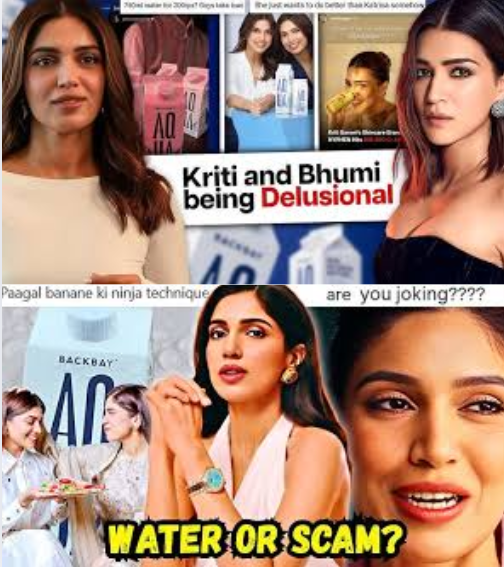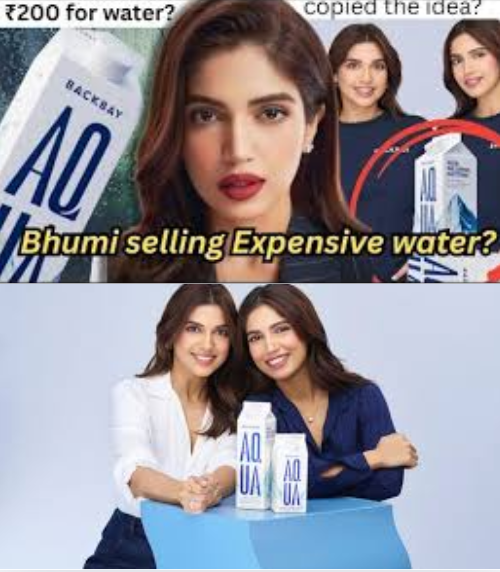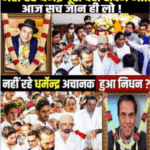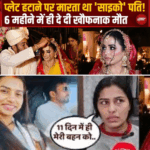Bhumi Pednekar SELLING 200 Rupee WATER BOTTLES| Kriti Sanon LYING ABOUT HYPHEN’s 400 CR REVENUE?
In recent times, several Indian celebrities have stepped into the business world, especially into wellness and lifestyle products. Bhumi Pednekar and her sister Samiksha Pednekar have launched a new beverage brand named “Bagh Eco,” starting with a premium product: natural mineral water sourced from the Himalayan foothills. However, what stirred controversy is not the water itself but its price — ₹150 for 500ml and ₹200 for 750ml. This steep pricing led many to question its accessibility and whether the product was truly meant for the masses, especially in a country where over 80 crore people rely on government-subsidized ration.
The brand claims the water is untouched by human hands, filled with naturally occurring minerals like magnesium, calcium, and potassium, and packaged in sustainable plant-based bottles. The concept is built on eco-conscious values: purity, sustainability, and women empowerment, as the manufacturing facility is run entirely by women in Himachal Pradesh. While these values are commendable, the real issue arises from Bhumi’s statement that the water is meant to be “accessible to everyone” and aims to change how India drinks water.
This claim has not sat well with the public. India, a country where millions struggle for basic necessities, hardly finds a ₹200 bottle of water “accessible.” Critics argue that while premium mineral water has a niche market, positioning it as a product for the general population is misleading. If the goal is truly accessibility, then pricing should reflect that — not alienate the very audience it claims to serve.

This situation isn’t isolated. Kriti Sanon, another Bollywood actress, co-founded a cosmetic brand called Hyphen, which recently claimed a ₹400 crore revenue in just two years. This figure raised eyebrows, especially when compared to established brands like Katrina Kaif’s Kay Beauty, which took years to reach ₹200 crore. Industry experts and creators like Nitin Joshi called out these inflated numbers, pointing out that most sales seem driven by aggressive PR rather than genuine market traction. It’s also worth noting that sugar cosmetics, one of India’s most popular D2C beauty brands, took nearly a decade to hit ₹500 crore. So the idea that Hyphen could jump from ₹7.5 crore in its first year to ₹400 crore the next seems too good to be true.
The bigger issue with celebrity brands isn’t just pricing or PR. It’s the narrative. These brands often sell premium products while cloaking them in the language of accessibility and empowerment. They use their celebrity reach to push aspirational lifestyles but forget that aspiration doesn’t always mean affordability. Many fans want to support their idols, but when products are priced out of reach and then marketed as “for everyone,” it creates a disconnect and even resentment.

Authenticity and transparency are vital. If a brand is luxury, market it as such. Don’t pretend to be solving national issues like water accessibility or promoting “affordable beauty” when the products are far from affordable for the average consumer. The Indian market is diverse — and while there’s room for premium products, honesty in branding is non-negotiable. Consumers today are smart, vocal, and unwilling to be manipulated by PR gimmicks.
As more celebrities enter the entrepreneurial space, it’s crucial they understand the responsibility that comes with influence. Selling premium products isn’t wrong — but misrepresenting their purpose is. Whether it’s Bhumi Pednekar selling “accessible” Himalayan water at ₹200 or Kriti Sanon claiming exponential growth without transparency, the audience deserves better. Brands that truly want to make a difference must align their messaging with reality — not just marketing trends.
Play video :
News
Dharmendra is no more, the whole country is in shock, know the truth today! Dharmendra Death Truth Revealed
Dharmendra is no more, the whole country is in shock, know the truth today! Dharmendra Death Truth Revealed The scorching…
Why Bharti Singh’s maid Manisha SUDDENLY DISAPPEARED?| Bharti USED TO FORCE her to shoot VLOGS?
Why Bharti Singh’s maid Manisha SUDDENLY DISAPPEARED?| Bharti USED TO FORCE her to shoot VLOGS? In the world of social…
33 Year Old Famous Beautiful And Gergous Actress Kelley Mack Passed Away
33 Year Old Famous Beautiful And Gergous Actress Kelley Mack Passed Away The world of entertainment has once again…
Meghalaya Murder mystery: Sachin Raghuvanshi’s girlfriend threatens the king’s house, high voltage drama ensues
Meghalaya Murder mystery: Sachin Raghuvanshi’s girlfriend threatens the king’s house, high voltage drama ensues The Raghuwanshi family has recently found…
TV’s ‘Simar’ has changed from head to toe! Divorce…Islam…Cancer… The famous actress has suffered many wounds!
TV’s ‘Simar’ has changed from head to toe! Divorce…Islam…Cancer… The famous actress has suffered many wounds! Deepika Kakar, a well-known…
Hansika Motwani Brokedown after she Filed Divorce with Sohael Khaturiya after 3 years!
Hansika Motwani Brokedown after she Filed Divorce with Sohael Khaturiya after 3 years! . . . Hansika Motwani and Sohael…
End of content
No more pages to load











